Tom's Guide Verdict
Big sound from the slimmest soundbar around is a good thing — but the HW-S800 isn’t the most even-handed performer we've heard.
Pros
- +
Hefty and expansive sound
- +
Remarkably unobtrusive dimensions
- +
Numerous control options
Cons
- -
No HDMI eARC or passthrough
- -
Midrange can get swallowed up
- -
Subwoofer doesn't integrate perfectly
Why you can trust Tom's Guide
Price: $899 / £749 / AU$999
Colors: Black
Ports: 1x HDMI-micro (ARC); USB (for servicing)
Speakers: 10
Audio channels: 3.1.2
Audio formats: Dolby Atmos; Dolby Digital; DTS; DTS:X
Power output: 330W
Wireless: AirPlay 2; Bluetooth SBC; Spotify Connect
Smart assistant: Alexa
Subwoofer: Dedicated
Dimensions: 1.5 x 45.7 x 1.6 inches (soundbar); 9.4 x 9.5 x 9.4 inches (subwoofer)
Weight: 3.1 pounds (soundbar); 14.1 pounds (subwoofer)
Wall mountable: Yes
Getting full-scale home cinema audio performance out of a single speaker unit has long been the ambition of many electronics companies — but Samsung, naturally enough, has decided to go one further. With the HW-S800, it wants to deliver full-on 3.1.2 Dolby Atmos spatial audio from a soundbar that’s so long and thin it barely looks like a soundbar at all. The subwoofer that ships in the same box is pretty small by prevailing standards, too, but next to the soundbar it looks like Goliath.
Control options are numerous, build quality is unarguable, and in quite a few ways the HW-S800 performs admirably — certainly it’s as good a pound-for-pound soundbar where Dolby Atmos sound is concerned as we’ve heard.
Physical connectivity is severely curtailed, though, and there are aspects of its audio performance that irritate just as surely as some aspects satisfy. Which means its appeal, in the final analysis, will probably be restricted to those for who getting sound from as small a speaker as possible is just as important as the actual quality of the sound they get.

Samsung HW-S800 review: Price and availability
The Samsung HW-S800 Dolby Atmos soundbar is on sale now, and it’s priced at $899. That translates to £749, and AU$999. It's available finished in black only and can currently be found discounted to $649 on Best Buy and for a fraction less on Amazon.
In terms of price, there’s no shortage of rivals for the Samsung. The Sonos Arc is the most obvious, given that it’s also a Dolby Atmos device and widely acclaimed as one of the best Dolby Atmos soundbars. The Arc doesn't come with a subwoofer, mind you, which might color your judgment one way or the other.
As far as being remarkably narrow and slender, though, the HW-S800 currently seems to have the field clear. If you want what promises to be full-fat performance from a skinny soundbar, the HW-S800 looks to be your only choice right now.
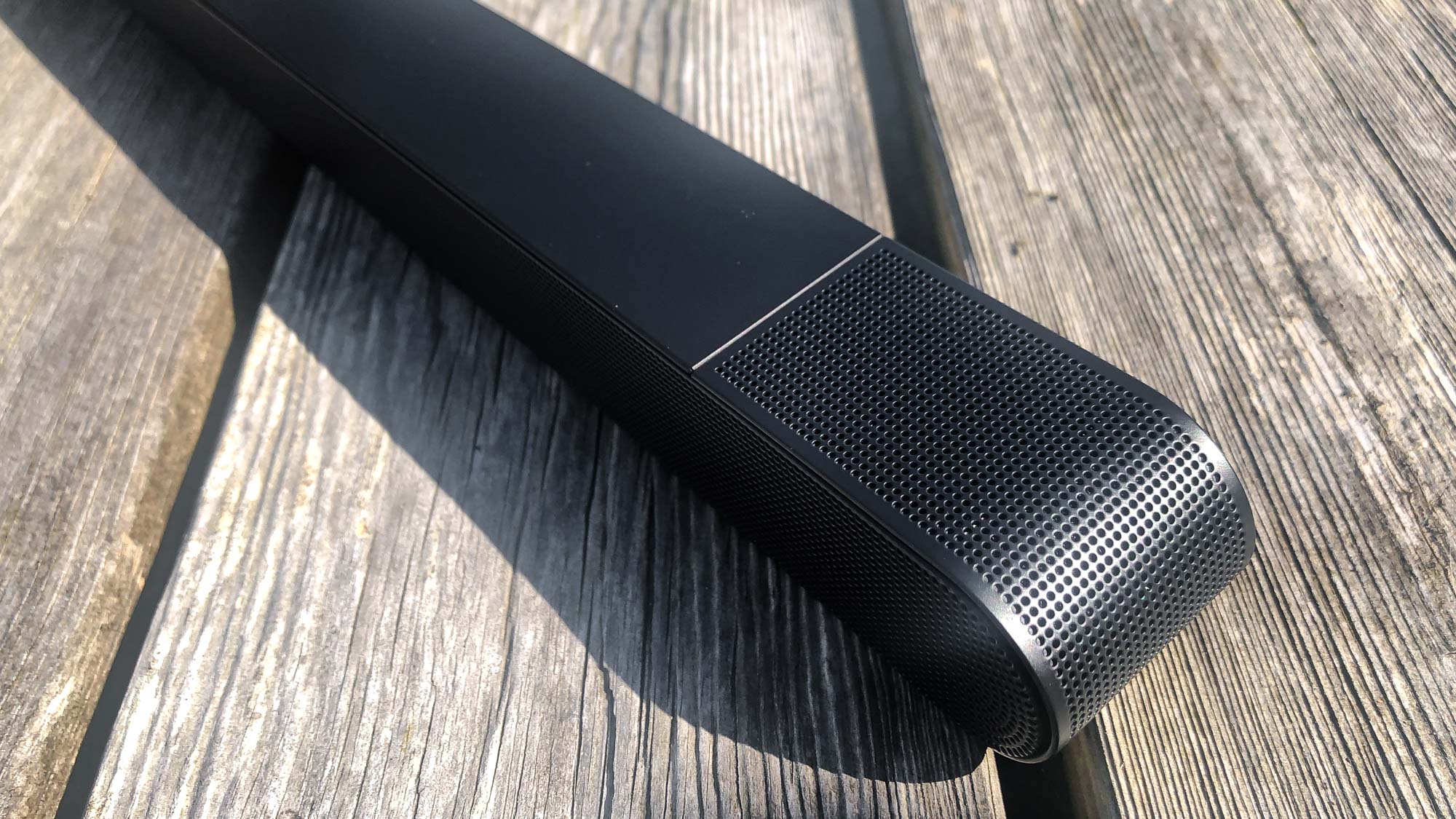
Samsung HW-S800 review: Design and build
Soundbar? Soundstick, more like. If you’ve one of those design-led televisions that sits low on its stand or feet, you know that a soundbar is going to get in the way and foul the bottom of your screen. Well, all soundbars except this one.
The soundbar portion of the HW-S800 is 1.5 x 45.7 x 1.6 inches (HxWxD). This means that it’s long enough to look a bit silly beneath a screen of less than 55in, but compact enough in the other two directions to sit happily (and unobtrusively) on the same shelf as any TV at all — even one that sits very low indeed on its stand.
And what there is of it is very nicely built and finished. The front plane is basically all perforated grille, and there are some more perforations at the curved ends of the soundbar and at the edge of the top surface too — it wraps around the curved ends of the soundbar smoothly. Cutaways for connectivity are neatly concealed at the back of the cabinet.
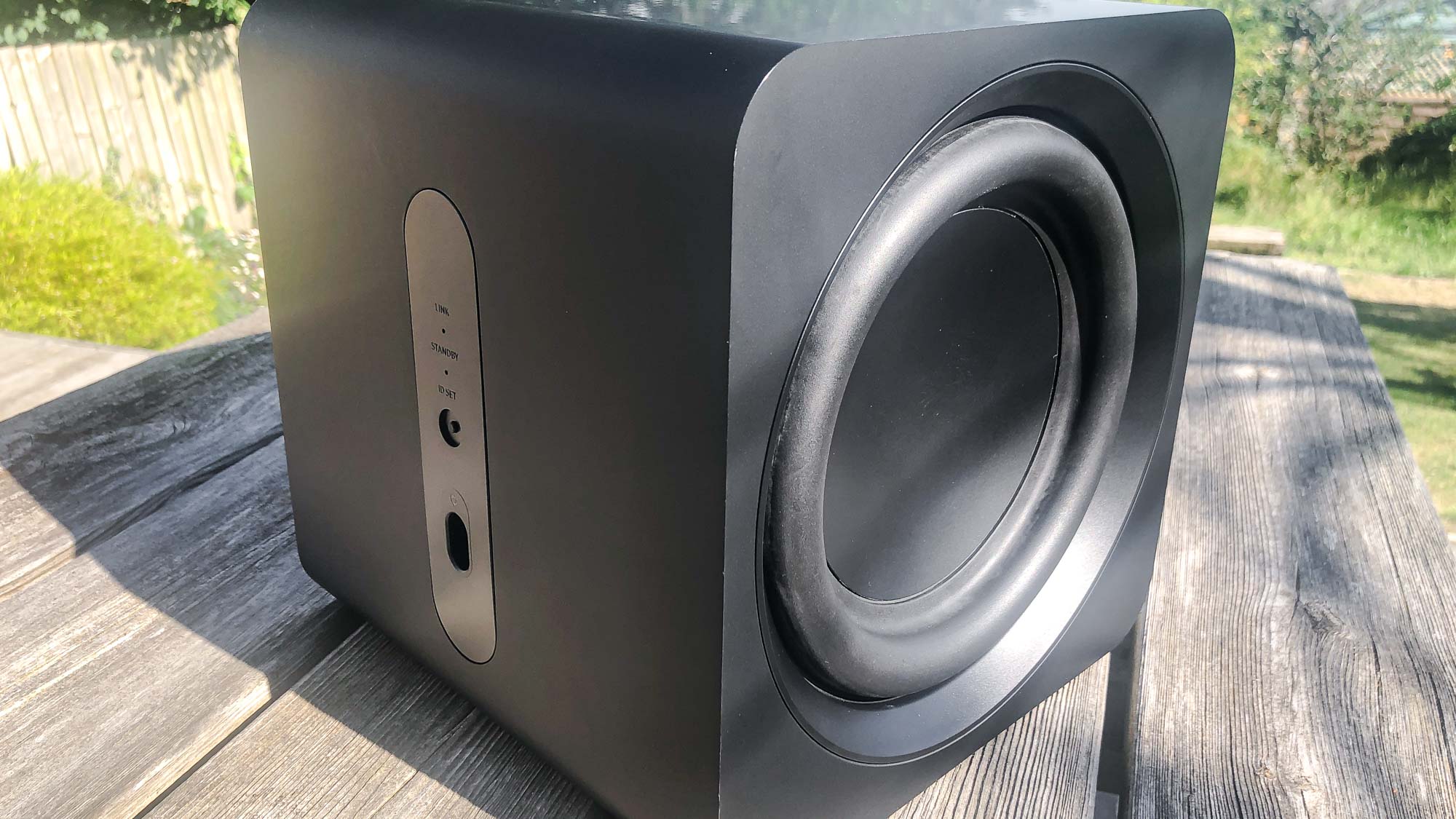
Samsung HW-S800 review: Configuration
The HW-S800 is designed to deliver a 3.1.2 variation of spatial audio sound — that translates a three forward-firing channels of information, the subwoofer and two upward-facing channels bringing the all-important sonic height. To this end, the soundbar features two tweeters, three passive radiators and four full-range drivers to deliver the ‘3’ and the ‘2’.
The subwoofer is less attention-grabbingly small, but at 9.4 x 9.5 x 9.4 inches (HxWxD) it’s certainly no bloater — and it too is quite impressively presented. The matte black finish of the curvy cabinet looks and feels good, the 6.5in driver and 8in passive radiator on either side of the box offer a rather purposeful appearance, and the fact that it connects wirelessly to the subwoofer means it can be stashed out of sight if the looks don’t do anything for you. It’s packing 200 watts of power, which really ought to be ample.
As well as Dolby Atmos, the HW-S800 is equipped with a few different listening modes: ‘night’ (which squashes dynamic range), ‘game’ (quite the opposite) and ‘DTS:X Virtual’ (which tries to extract a sensation of spatial audio from stereo information).
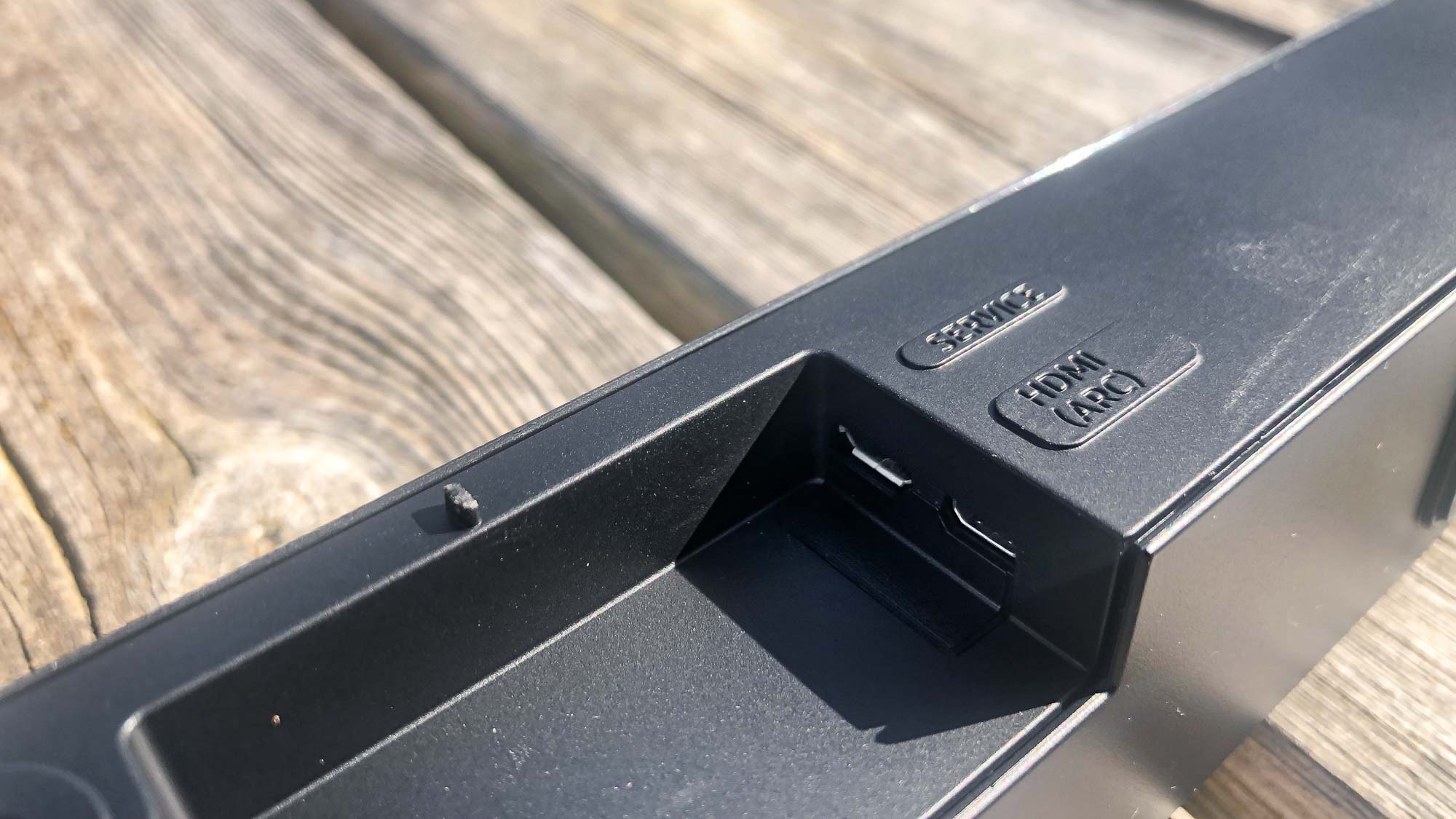
Samsung HW-S800 review: Connectivity
It’s inevitable that Samsung, having gone all-in on delivering the slenderest soundbar it possibly could, had to make a few compromises. And that’s perhaps more evident where connectivity is concerned than anywhere else.
For wireless streaming, there’s Bluetooth 4.2 and Wi-Fi — the former is compatible with a wide selection of codecs, including AAC, WAV and FLAC, while the latter brings Apple AirPlay 2 as well as Spotify Connect compatibility via the SmartThings control app. The soundbar also communicates wirelessly with the subwoofer. And if you’ve an appropriate Samsung TV, the HW-S800 can connect wirelessly to it — and exploit Samsung’s Q Symphony audio feature at the same time.
Physical connectivity is a little less predictable and slightly more problematic. In addition to an input for mains power, there’s a microUSB socket for servicing and an HDMI ARC input. It’s a Micro HDMI input, though — and not only does the user manual seem to take more pleasure than is really necessary telling you the cable you’ll need is not supplied, it states the connection is ‘Mini HDMI’. It’s not — it’s Micro HDMI.
So there’s no HDMI passthrough and, as the Micro HDMI input isn’t eARC, the Dolby Atmos sound you get to hear will be of the lossy variety. That’s fine if you’re deriving your Atmos content from the likes of Netflix (which streams lossy Atmos anyway), but if you’re discerning enough to be using a 4K UHD Blu-ray player you won’t be hearing quite as much as it’s capable of delivering.
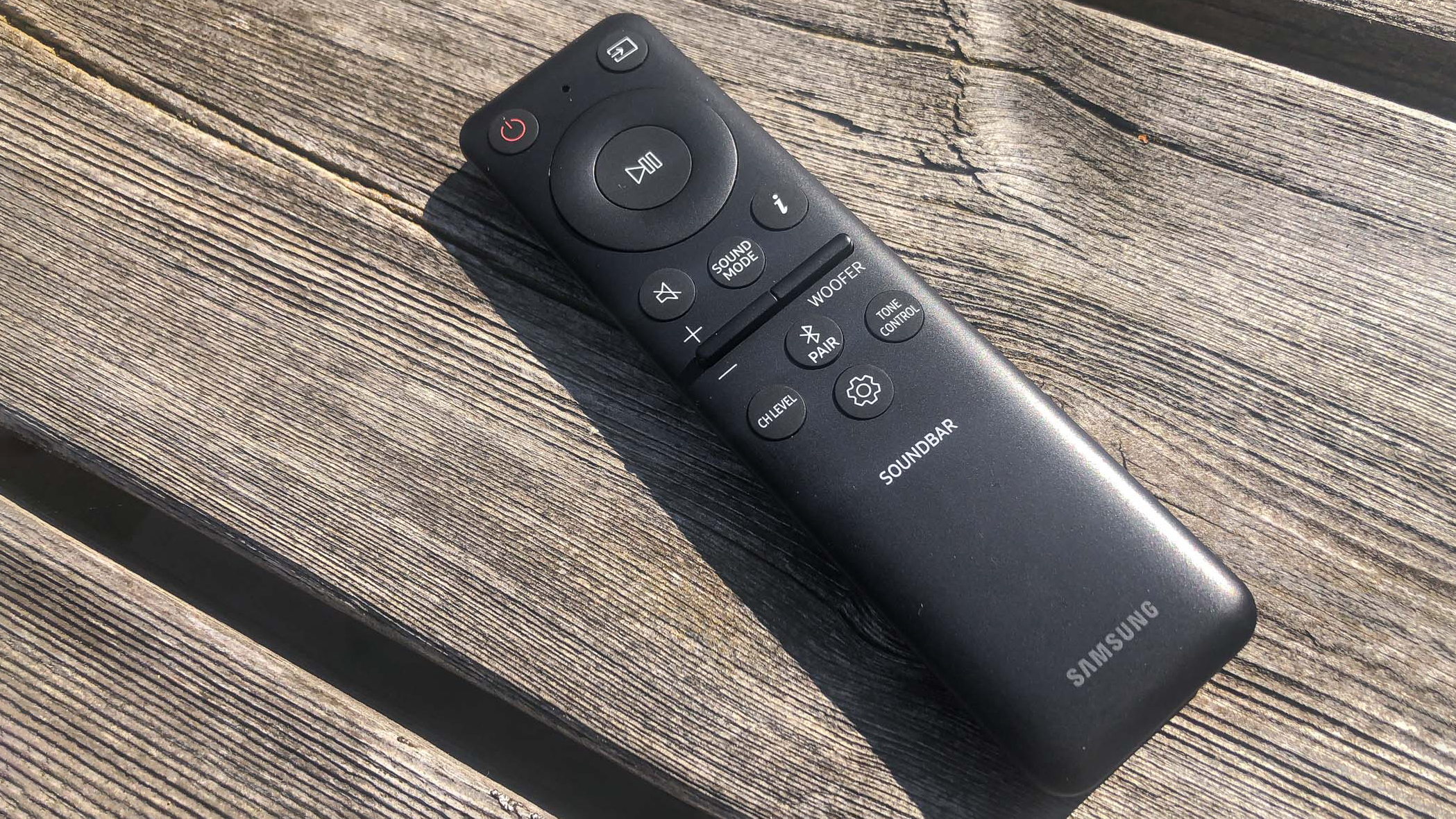
Samsung HW-S800 review: Controls
The HW-S800 ships with a little remote control that’s rechargeable via USB-C. It’s slender and feels a little low-rent in the hand, but it incorporates plenty of functions: balancing the volume of the soundbar against the subwoofer, selecting input, cycling through sound mode options and plenty more besides. The soundbar itself responds either by altering the status of the little row of LEDs behind its grille and/or with an altogether too assertive voice confirming the action you’ve taken.
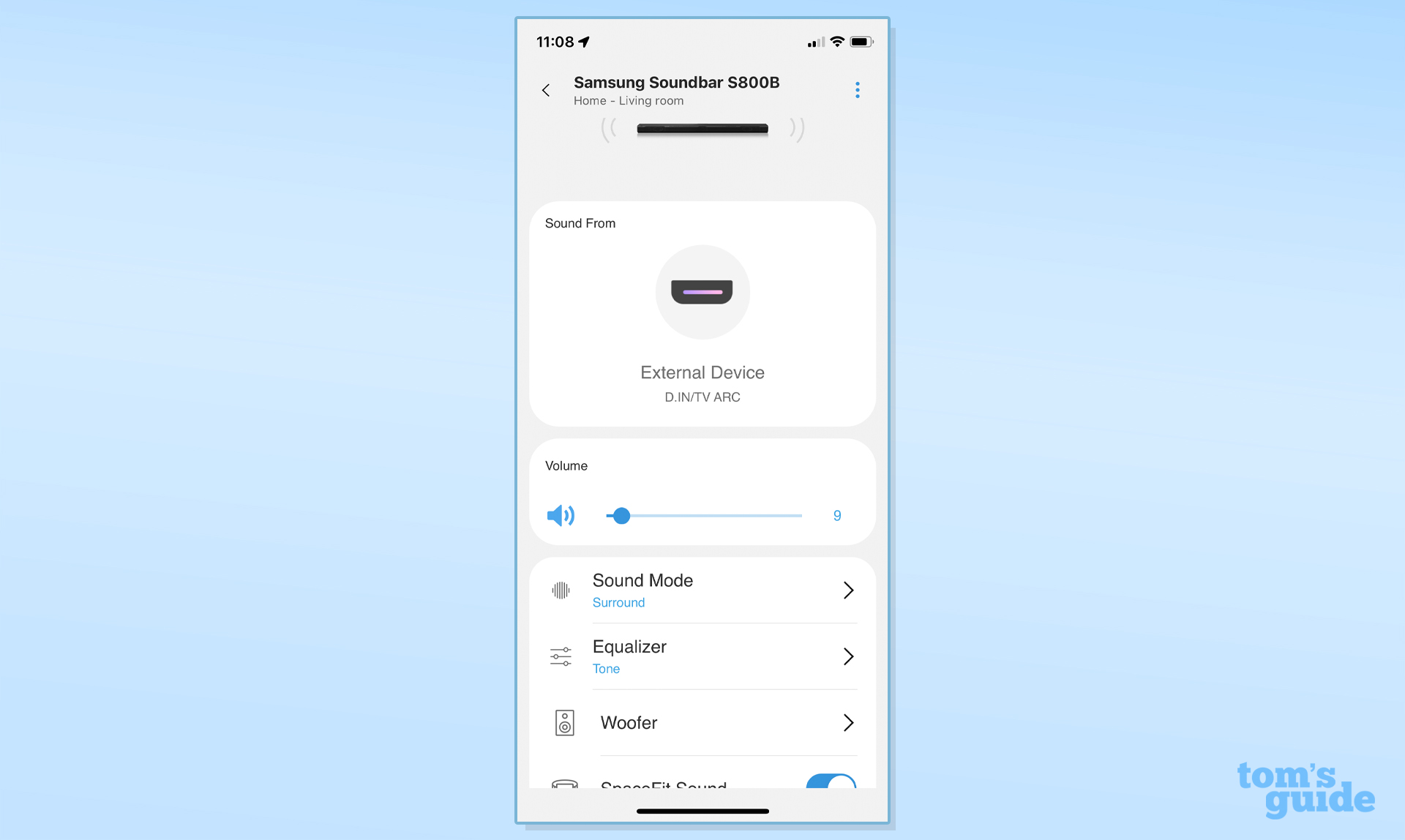
The HW-S800 is compatible with Samsung’s SmartThings control app, too — which, as long as you’re comfortable with it knowing much more about you than any other control app seems to require, is a good thing. Here’s where you can integrate Spotify, enable Amazon Alexa voice-control, make EQ adjustments and plenty of other (less compelling) functions too.
Alexa itself is sharp-eared and responsive. There are a few touch-controls on the top surface of the soundbar, and one of them is ‘mic on/off’ in case you don’t wish to be overheard.
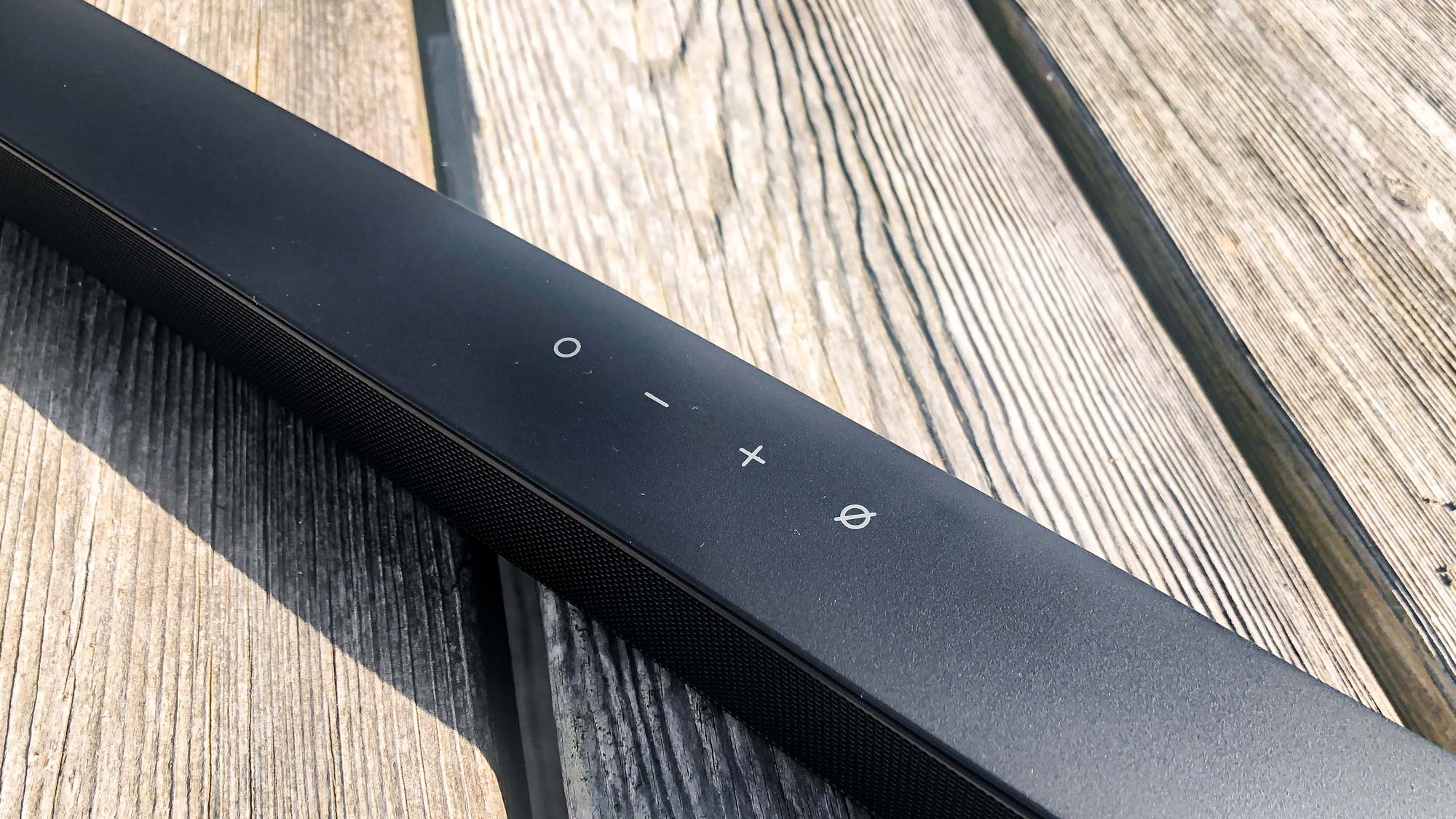
Samsung HW-S800 review: Sound quality
What’s most immediately impressive about the way the HW-S800 performs — and what may quite conceivably seal the deal for anyone who’s attracted by its physical dimensions — is the size of the sound it delivers.
With the lossy Dolby Atmos soundtrack to Bird Box delivered via Netflix to the Samsung’s HDMI ARC input, the scale of the soundbar’s presentation is quite startling. It reaches quite a long way on the left/right axis, and offers a more convincing sensation of height than quite a few similarly priced competitors we could mention. ‘Dolby Atmos from a soundbar’ is more often an ambition than a reality, but the HW-S800 offers a sound that reaches high above the top bezel of your TV — and is quite immersive as a result. Focus is good, as is separation — so the stage the Samsung creates is easy to understand. Effects move around it with confidence and positivity.
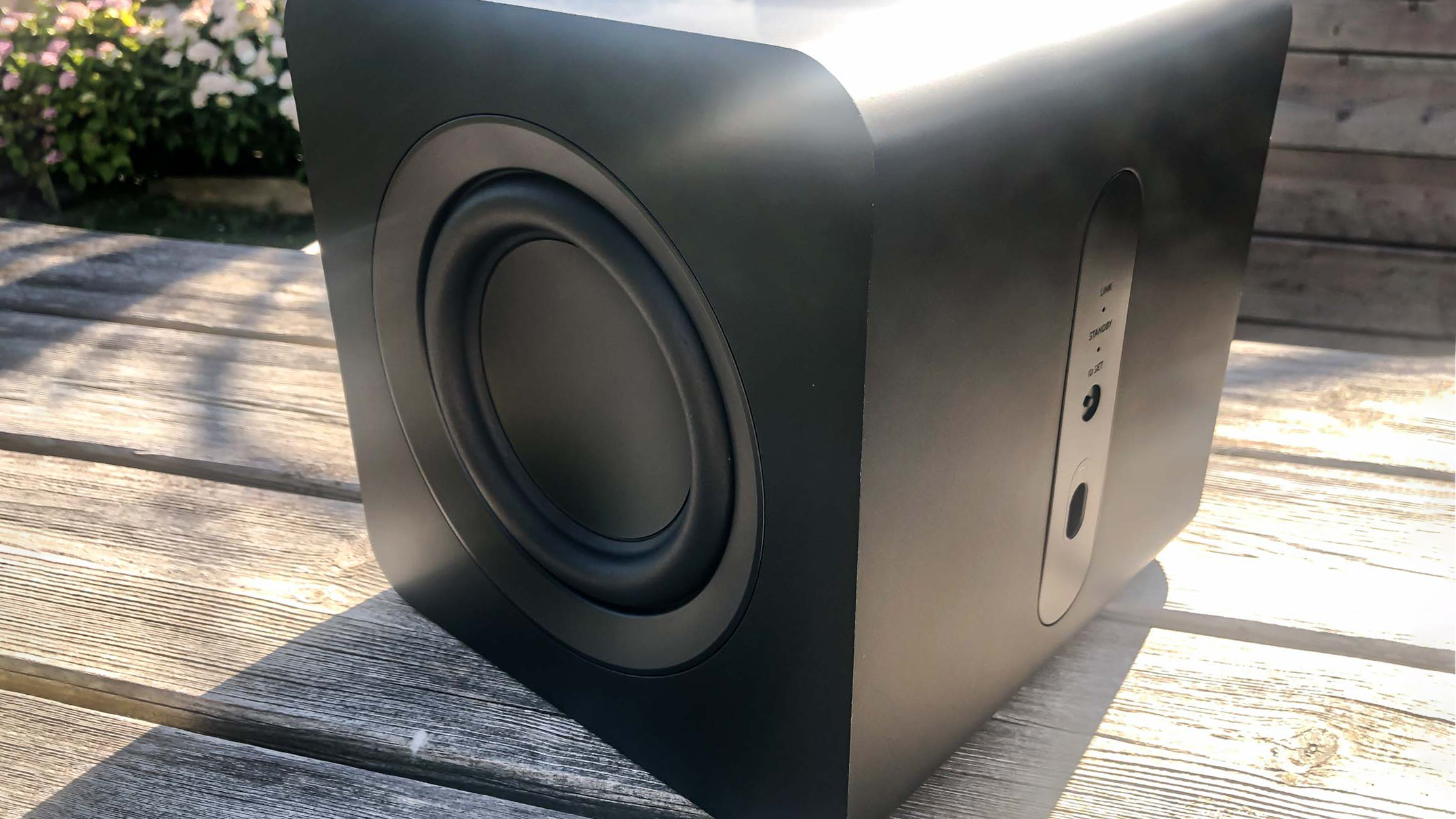
The subwoofer does good work in almost all circumstances, digging respectably deep and hitting with well-controlled resolve. The bass sounds it produces are textured and detailed, and there’s sufficient authority to ensure blurring into or out of low-frequency sounds is kept to a minimum. There’s a pleasant solidity to the subwoofer’s output that adds to the strength of the sonic foundation it creates.
No matter if you’ve used the ‘SpaceFit’ algorithm in the SmartThings control app to allow the HW-S800 to adjust its output relative to the room it’s positioned in, or taken care of business yourself using the remote control handset, achieving a smooth handover from the subwoofer to the soundbar is one of the trickier tasks you can set yourself. The crossover point between the two devices is always apparent, and no matter how you might seek to finesse it, it seems the point at which the subwoofer hands over to the soundbar or vice versa will always be evident.
The midrange is detailed and communicative when things are relatively calm — voices are granted plenty of character and are given a decent amount of space in which to work. The same is true of the top of the frequency range, which is crisp and substantial without getting in any way hard or coarse. But when the on-screen action ramps up, not only does the HW-S800 demonstrate considerable dynamic headroom but it also allows the midrange to get subsumed by the high- and low-frequency activity going on around it. Both ends of the frequency range seem to get a whole lot of ill-deserved confidence when the going gets raucous, and while this doesn’t affect the size of the Samsung’s presentation it has quite an impact on its coherence. There’s nothing linear about the way the HW-S800 handles big changes in dynamics.
Samsung HW-S800 review: Verdict
For some customers, the fact the HW-S800 makes any kind of sound at all will be all the justification they require to invest in the tidiest, neatest soundbar around. And the fact it makes good(ish) on its promise of Dolby Atmos spatial audio will lure in some waverers, too. But as far as achieving a nice linear response to big shifts in volume or attack, or a smooth interface between soundbar and subwoofer, the Samsung HW-S800 is still a work in progress.
Simon is a freelance technology journalist and consultant, with particular emphasis on the audio/video aspects of home entertainment. Before embracing the carefree life of the freelancer, he was editor of What Hi-Fi? – since then, he's written for titles such as Wired, Metro, The Guardian and Stuff, among many others. Given time, Simon likes nothing more than publishing and then quickly deleting tweets about the state of the nation (in general), the state of Aston Villa (in particular) and the state of his partner's cat.


